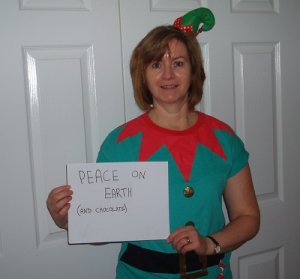
On Tuesday 23rd December, Harlequin Historical authors will be tweeting under the hashtag #undermytree to share what we'd like for Christmas.
I will be posting this picture!
"I is for Internet"
On the first Friday of the month, Novelista Annie Burrows shares snippets from her writing life. In alphabetical order. This month she's reached the letter IWhen I first started writing, I used a small word processor which I got second hand. I used floppy disks (which regularly got corrupted) to save my work. And when I wanted to do any research I went to my local library.
I used to spend hours browsing around the stacks, desperately searching for that one nugget of information I needed, and getting pretty frustrated in the process. I never did find a book that could tell me where troops used to embark during the Peninsular War, or how often injured officers got sent home - though there were half a dozen biographies of Lord Wellington.Eventually I realized I was going to have to cut back on the time I spent doing this sort of research, and concentrate on writing the story, or I was never going to get anywhere. So - I couldn't find out where the troops disembarked from - did I really need to put it in my story? Couldn't my heroine just receive a letter saying that her brother/uncle/sweetheart had sailed?I still spent a lot of time going through second-hand bookshops, hoping to find that one book which would have the specific bit of information I wanted, and in the process learning all sorts of things that might come in useful one day (and subsequently have).
The next computer I bought (again, second hand so it was practically on its last legs) had a button I could press which would connect me to the internet. Which opened up a whole new world of research possibilities. Whatever I wanted to know about, you could bet someone had written an article (or blog, as online articles are known - mad, eh?) about it.And now came a whole new form of time-wasting. Instead of getting on a bus and going into town, where I would spend hours finding out virtually nothing useful, I could now waste an entire morning finding out a whole lot more than I ever actually needed to know. Because every article (sorry, blog) seemed to have a link to another blog about something connected to the topic, which looked absolutely fascinating. So I may have started out wanting to find what kind of rifle a soldier would have carried in 1815, and instead found a page which told me all about the parlour games people would have played during Christmas of 1814, and then stumbled upon all the information I'd wanted to find out about troop movements in the Peninsula three books ago!
I now regularly use one site to find colourful phrases for my characters to use, another to make sure that the language I put into my character's mouths was actually in use at the time they were alive, and another when I want to describe a Regency dance.
So - internet - good for research? Yes, in that it's easier to find out exactly what I want to know.However, I now have to be careful that I don't just end up wandering through the stacks of knowledge available to me from my own armchair, instead of getting on with the story.And don't get me started on facebook. Yes, it's a great way to keep in touch with readers and friends. But do I really need to watch that video of a dog going berserk in obedience school? Again?
"H is for heroes"
I've recently handed in a book that is going to be part two of a historical trilogy. The three books in the series deal with the loves of three officers in the same regiment, who fight at the battle of Waterloo. And about the first thing my co-continuity authors wanted to know about my episode was "What does your hero look like?"
Sarah Mallory and Louise Allen had already put pictures in our joint files of actors who'd inspired them when it came to imagining their heroes.
Sarah Mallory chose Peter O'Toole when he was Lawrence of Arabia for the Colonel of our fictitious regiment.
Louise Allen picked Sean Bean for her Major Flint.
My problem was that although I had a clear image in my head of my own hero, I hadn't based him on an actor. I just can't do that. Because for me, what the hero is like inside, as a person, is far more important than what he looks like. I always start with the personality, and work outward. And if I start picturing a specific actor when I write about my hero, I'm always worried that the actor's personality traits might sneak in.However, Sarah and Louise - who write much faster than me - were already writing scenes where my hero would have to stride across their pages, and really, really wanted to know what my hero looked like.Fortunately (for them!) about that time I found an image of Tom Hiddleston in a cravat, from when he'd been playing a nineteenth century gentleman. That was about the nearest I could come to explaining what my hero would look like. And it wasn't about his features. It was about the cleverness you could see in his features. The potential for wickedness beneath the charming smile.
Posting an image of Tom certainly inspired their imaginations. Whenever they sent me a scene in which he appeared in one of their books, they had my Artillery Major off to a "T". He was a flirt. A charmer. And devilishly good-looking.Thinking about Tom Hiddleston kept them happy for a while.( Well, he seems to make a lot of ladies happy.)Until they wanted to know what his name was. I had to explain that he hadn't told me yet. In my defence, I explained that I was only on about chapter 3 by then, and he was only just waking up after having sustained a head injury. He was confused, and concussed, and couldn't everyone just call him "Sir."I can't remember exactly when, during the course of the emails pinging back and forth as we created our fictional regiment, we started referring to him as Tom. And then, when I couldn't come up with a surname, Louise Allen coined the nickname Tom Cat, which really, really suited him.
This kind of procedure is how it usually goes for me when naming my heroes. I know that some authors can't start writing their heroes until they have a name, but I find that mine don't tell me what it is until I have got to know them pretty well. My secondary characters had to speak of one of my heroes as Lord Rakey Rakerson well into my second draft of his adventure!And it's the same with the book I am currently writing. I know quite a lot about my hero's childhood, and naval career. At the time he meets my heroine, he's reached the rank of Captain. He is also an Earl to an almost bankrupt Scottish estate. So naturally, the heroine has been having to call him Captain Lord Scotsman.But only a few days ago, his sister (who is a minor character in the story) bounced up to him calling him Alec. Which is short for Alexander. And since I knew her name was Lizzie Dunbar (because it's always much, much easier to name minor characters) that meant his family name had to be Dunbar too. Which is just right, and sums him up perfectly. Alec has a sort of cautious ring to it, somehow. He is a solid, dependable sort of chap. He is also the Earl of Auchentay (a Scottish area I invented several books ago, which has come in very handy)And yes, I have the same slow process when it comes to naming my heroines. I think it is because it is so important that they get a name that really, really conjures up an aspect of their character - something that will help them to come to life on the page. I can't just pluck any old name out of a baby book, or something similar. The name has to have a resonance. Tom was a good name for my military hero - there's nothing stuffy about a Tom, is there? And you can imagine a Tom being brave on the battlefield, insubordinate to his officers, and lethal with the ladies. And once we started calling him Tom Cat, well...If you'd like to read more about Lord Rakey Rakerson, well, this is the book he became the hero of. (available at Amazon UK and Amazon.com )You'll have to wait until next Christmas to read about Captain Lord Scotsman!
"G is for gladrags"
Most of my time is spent sitting in my study, typing away on my laptop. But very occasionally, I get to go out and do something amazing - because I've become an author.
A couple of weeks ago, for instance, I painted my nails silver, got all dressed up, and went out to the AMBA (Association of Mills & Boon Authors) lunch. I even booked a seat in a first class carriage, where I was plied with various snacks and drinks all the way to London.
I met up (accidentally) with two other historical authors on the tube train, and together we made for the Charing Cross Hotel.
Then it was drinks in the bar with more of the historical team, followed by the lunch itself. A three course masterpiece.
Senior editor Linda Fildew, Carol Townend, Louise Allen , Janice Preston, Sarah Mallory
and Elizabeth Beacon
Historical authors Claire Thornton and Annie Burrows
I was sitting in between Claire Thornton
, author of a fabulous trilogy set during the Great Fire of London, and the RITA award-winning Sarah Morgan.
Also at my table was Facebook friend and fellow Strictly fan Kate Hardy.
Kate and Annie demonstrating promenade hold
There was a brief lull after speeches from the managing director of Harlequin UK , Tim Cooper, during which Sarah Mallory, Louise Allen and I invaded the Virgin lounge in Eagle Place. It gave us time to discuss strategy for the launch of our own trilogy next year, which will come out to coincide with the 200th anniversary of the Battle of Waterloo.
Annie Burrows, Louise Allen and Sarah Mallory
Then it was off to the Meridien on Picadilly for the "Author Toast", hosted by the publishers, where authors Julia James
and Chantelle Shaw
were awarded Tiffany
pins for publishing 25 stories apiece.
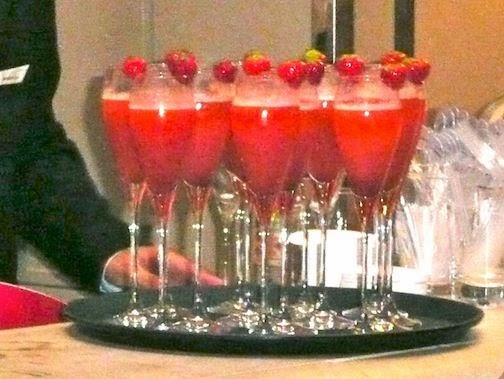
I drank two Rossini's, which have become my favourite cocktail, before dashing across to get my train home.
I didn't have a seat booked, which meant I had to join the 300 m sprint for the one carriage which wasn't full, when the gate opened.
Talk about coming back down to earth with a bump!
"F is for foreign editions"
One of the great things about writing for Mills & Boon is that my books get translated into all sorts of languages. It's always a terrific thrill when I receive my author copies of these books. And also fascinating to see how marketing departments in various parts of the world go about trying to tempt readers to buy.
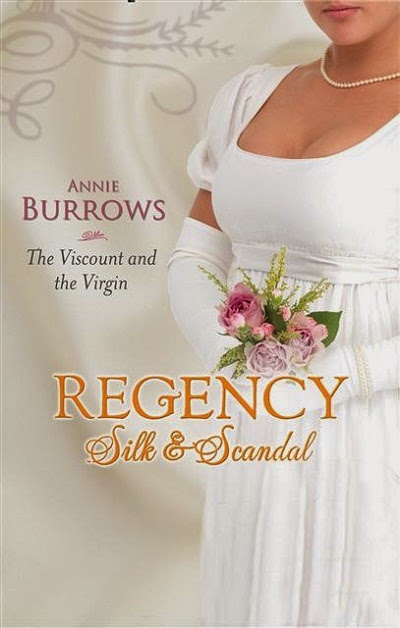
For example, here is the cover of the version of my story "The Viscount and the Virgin" Lovely and romantic, clearly focussing on the fairy-tale wedding between my virginal heroine, and her hero.
And here is the American version of the same story - clearly focussing on the wedding night!
Many countries simply take the cover art from the first edition (usually UK), and put their own title and pricing details over it.On the right, is the Greek translation.Others go all out, creating fabulously images which hint at some of the details of the story within the covers. Below is the Norwegian edition of "His Cinderella Bride".But I think my favourites of all are the Japanese editions. They are not only beautiful in themselves, but have an added air of mystery about them - opening from what I would consider the back, and with all that inscrutable text. It took me some time, after receiving my 1st Japanese translation, to work out which book it had originally been. Now I know to consult the copyright page (which is at the back, no - front, no...well, at one end, anyway!)Below is the Japanese translation of "My Lady Innocent" a story set in early Tudor England.Not only do the Japanese produce (what I assume are) straightforward translations of my books, but they also do comic-book versions.
Manga cover of Never Trust a Rake
Manga cover of The Rake's Secret Son
Above is a Japanese manga scene from "Never Trust a Rake" On this page the hero and heroine are clearly having words - she looks as though she's slamming the door in his face. Though I don't remember writing a scene where she does that!
When Jessica put out a request for any authors who’d like to do a guest post for the Write Romantics Saturday Spotlight, I emailed, “Yes please! Me, me, me!” Well, you see, my eighteenth book comes out in September, so this is a great opportunity to do a little bit of promotion for it.
Problem is, I didn’t have a clue what to write about. I’ve spent an awful lot of my summer holiday sitting on the beach racking my brains over what I could write for this one – before eventually deciding to just own up.
I am officially RUBBISH at blogging.
I don’t mind doing the ones where someone sends you a list of questions to answer. Because the questions are all about me, (the one subject on which I’m actually an expert.) Though I always feel rather sorry for whoever then gets to read the results. What have I got to say that every other single writer who’s answered those same questions hasn’t already put?
For example:
Q – Why do you write?
A – Because I can’t stop.
Q – Where so you get your inspiration?
A – I have a head full of characters doing far more interesting things than ever happen to me in real life.
(You must have read dozens of blogs just like that.)
So – although those blog posts are easy for me to do, I always suspect they make for dreadfully tedious reading. Which makes me a bit uncomfortable. The last thing I want to do is bore my readers.
So on the whole I prefer to have a stab at the type of blogs where someone like Jessica gives me carte blanche. “Write whatever you like!”
Trouble is – what I like writing is fiction. I’m a story-teller, not a blogger. When it comes to writing snappy little articles designed to show you all what a scintillating person I am, and thus tempt you to sample my book, I’m never sure quite where to start.
Should I talk about a bit of research I did? Unfortunately, I am hampered by the fact I write historical romance. I can’t say, like someone who writes contemporary romance, that I’ve just come back from a walking trip up the Alps where I went to get flavour for my next Swiss-set romance, featuring a financier and a mountain rescue worker can I? I can’t physically visit the Regency era.
And how interesting would you be in hearing how many hours I spent scouring etymological dictionaries trying to make sure my hero could “make a run for it” in 1815 (yes, he could, since it has been used as a term for taking flight since the 1640’s), or browsing the website of Westminster Abbey to see which poets had already got monuments that Regency sightseers could have seen?
And I don’t think anyone would be fascinated by an account of my writing life. I sit down in my chair. And I write. That’s it. That’s pretty much my writing day (apart from coffee breaks timed to coincide with pop-master on Radio 2, Let’s do Lunch with Gino and Mel, and Countdown.)
I don’t even have any fascinating hobbies. When I’m not writing, I read what everyone else is writing. (Though I have taken to borrowing a dog on Mondays to make me go out for a walk as I’m a bit worried I’m going to turn into blancmange if I don’t get a bit of exercise.
But lack of inspiration isn’t my biggest problem when it comes to blogging. No. It’s my mother. She was terribly strict about good manners. And one of the worst offences I could commit was to “swank”. So basically, I find it very hard to push myself forward, or blow my own trumpet.
Which is what this type of promotional blog should be about. Whatever content I create, I always have that nagging feeling that what I’m really trying to say is “buy my book”. Which makes me cringe. And yet I do want you to buy it. Because I think a lot of you will enjoy it. If you like Regency set romances with a hero who has never wanted to get married suddenly finding he has no choice, and a heroine who would rather hide behind a potted palm than get whisked out onto the dance floor and into his chaotic lifestyle, you should find Lord Havelock’s List a fun book to read.
Oh, and if you’d like a chance to get your hands on a free copy, I’m doing a giveaway on Goodreads from 2nd to 16th August. You can find out more here.
I'm never satisfied with what I write. I even go through my emails a couple of times before hitting "send" to make sure I haven't included any typos.But that kind of pernickety attitude is essential for anyone who wants to become a published author.I don't think anybody can sit down and create a brilliant book in just one draft. I certainly don't know anyone who claims to have done so. But every author I know has a slightly different way of getting their writing up to a standard they feel ready to publish.Some people edit as they go along. At the start of their writing day they will read over what they wrote the day before, and only move on when they're satisfied with the quality of the prose.That approach has never worked for me. I get so bogged down in the grammar, spelling, and so on that the story usually grinds to a halt. On my first draft I have to just write the basic outline of the story as fast as I can, before I lose control of where I want the characters to go. At least, that is what I aim for as I write. But whenever I print out and read back this first outpouring, I nearly always end up clutching my head in despair. Because what I thought was a brilliant story turns out to be an absolute mess.However, recently I've discovered that others have a similar experience. And have even coined a phrase to describe the method. It's known as the "sandbox" approach. Basically, my first attempt to tell a story is like flinging a great mound of sand into the sandbox. It's shapeless alright - but I have everything I need to create a fabulous fairytale sandcastle once I set to with a bucket of water and a spade!OK - I've got my heap of sand. How do I turn it into my fairytale castle?Well, basically, I want the story to flow from beginning to end. I want to build tension, to keep a reader turning the pages. I want every sentence to drive the story forward, whilst showing the reader something about the leading characters.But exactly how can I achieve this? You have all heard the adage that you should "show, not tell." But you need to be careful not to overdo the little "tells" you think add to characterization. It's all very well havingyour heroine twirling a tendril of hair round her finger to denote how nervous she is, rather than just saying "she was nervous". But if you have her twirling her hair every two or three pages she'd going to become tiresome. (Likewise - the hero shouldn't be grinding his teeth at the slightest provocation.)Setting the scene is important to draw your reader into the world you've created, but over-long periods of description really slow down the pace. I'm jolly glad I discovered this, because I'm not very good at descriptions. When I first started trying to write books, I used to sweat for hours over details of a house, or a room. Nowadays I just tend to give the hero or heroine's impression of their surroundings, how it affects their mood perhaps, and leave the reader to fill in details for themselves.Some writers will advise you to leave a manuscript for a week or so before reading it over, so that you can come to it with a fresh eye. This may work for some of you, but again, I have to confess it's not a technique I find terribly helpful. You see, I tend to see what I think I've written, rather than what I have actually typed. Printing it out, so that I'm looking at my work in a different medium from the computer screen, does help me to spot some mistakes and weaknesses. But nothing is as effective as reading the story out loud. If my tongue gets tangled up, that is how the sentence will feel to a reader's eye. And if I say it differently to how it appears on the page, I change the text to how I said it - that makes for an easier, smoother read.And yes, going over and over and over a manuscript before sending it off to a publisher does take some patience. But I've heard the act of creating a publishable story likened to reducing a fine sauce for a fine meal. And everyone knows you can't make a good béchamel, in a hurry. You get lumps.And who wants a lumpy novel?
The Novelistas celebrate again!

Last week I went to the launch of fellow Novelista, Anne Bennett's latest book, "A Girl Can Dream"
She gave us lovely little goody bags filled with themed gifts, as well as bringing a cake to share.
Ann writes family sagas, set in Birmingham. This one is set during the days leading up to the second world war, and tells how Meg, the heroine, struggles to look after her younger brothers and sisters, gives a heart-rending account of their evacuation, and goes on to describe Meg's experiences as a Land Girl.
Ann is a member, like me, of the Novelistas. We try to meet up once a month, to support each other, celebrate our successes, and generally discuss the business of writing. So, after getting our signed copies of Ann's book, drinking the bubbly and eating the cake, we talked about what is going on in our writing life.

Jo Grassick has just had her first publication - a short story in the Sophie King anthology, "Love is All You Need"
And this month, we were also planning promotional items to take to the Romantic Novelist's Conference, where Juliet Greenwood and I, as authors of historical fiction, will be taking part in an event at the living museum at Blist's Hill.. She gave us all a bookmark to commemorate the occasion.
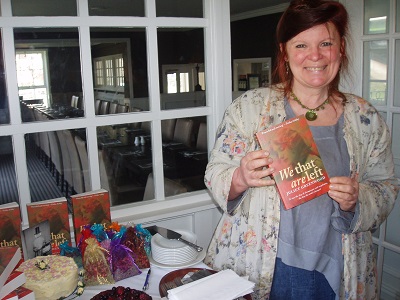
Juliet Greenwood has also recently brought out a book set in wartime, "We That are Left"
, but hers is set during the 1st world war. This week, when it was a "kindle daily deal", it shot up to the number one slot in Amazon UK, for women's fiction. So next meeting, we'll all have something else to celebrate!
Not long ago I joined a reading group. Quite a literary one. I was hoping to stretch my mind a little, by reading more challenging books than I'd normally choose. But what I've gained from attending has been so much more. Discussing books with others has reminded me what readers are looking for in a book.Time and time again, it hasn't been the cleverness of the prose, or originality of the plots, or evocative descriptive passages that have sparked off the most heated discussions. No - it's been the likeability of the characters. No matter how well written a book, if we don't find something about the main characters to like, we won't give the book a high mark. But we think of the whole book with fondness if we connect with the main characters.This is one of the reasons Jane Austen's books have prompted so many people to write sequels, or spin-offs. Her characters are so well-drawn that they not only come to life on the page, but often take on a life of their own. A lot of us want to know what happens after Lizzie and Mr Darcy get married, and will gladly read books, or watch films where they go on expeditions to Egypt, solve murders, or even fight zombies.
Oh, I want to create characters like that! Characters that step right off the page and take on a life of their own. Long ago, I realized that I don't have a gift for writing descriptive passages, or thinking up cleverly twisty plots with a surprise at the end. but anyway, I would rather my readers empathize so deeply with my heroines that they will laugh with them, weep with them, and fall a little bit in love with the heroes who stride manfully into their life and make their hearts flutter.So I spend ages reading books on psychology, problem pages in the backs of women's magazines (because aren't a lot of the problems in them caused by partners?) and life stories of people who lived during the Regency era, to learn how they would have treated the problems life threw at them.I also read other writer's tips on how to create characters that will come to life in a reader's imagination. Just this week, I've discovered fellow Harlequin writer Annie West's website, on which she gives some very useful advice about creating heroes. All of which could apply to Mr Darcy.
What am I working on?I'm collaborating with two other Harlequin writers (Sarah Malloryand Louise Allen
) in a trilogy which we're bringing out in 2015 to commemorate the bicentenary of the Battle of Waterloo.
So far we're calling it "The Battlefield Brides", but that is just a working title. It's great fun working on a continuity, like this. I have two other ladies immersed in my characters' adventures, and we're constantly chatting to each other, via emails, as our work progresses. We might be checking background research, making sure our timelines match up perfectly, or simply swapping pictures of the actors we'd like to play our heroes.(Above, Major Adam Flint, Hero of Louise Allen's book, brooding...)(Right, Major Bartlett, plotting the seduction of my heroine)How do my stories differ from others of their genre?Every writer, in fact every person on this planet has a unique personality. No two of us are alike. If three people were to write down a description of the same event, each of them would be radically different - because each person looks at the world through a unique perspective. So my books reflect my take on life, which tends to mean that they keep on leaning towards the more light-hearted end of the Regency spectrum. If I have a highwayman holding up a coach, for example, it is as likely to turn into a comic scene as a moment of high drama.Why do I write?I'm very tempted to quote Valerie-Anne Baglietto's answer here (from previous blog post) In a nutshell, I can't help it! Like Val, if I don't write, I get twitchy. Like Val, I've always had a cast of characters flitting like butterflies through my brain. When I was very young, I used to think of these people as my "invisible friends". And nowadays I still feel as if I spend my time writing down the adventures of my invisible friends.How does my writing process work?If only I knew! Well, ok, then. Basically, I have a set of characters, or a scene, drifting around my mind which I feel a need to write down. Because I make my living from writing, I then have a jolly good think about whether I could make that scene, or those characters, grow into a fully fledged story. (I have dozens of notebooks full of snippets which may or may not get used.) If I think a story will "work", or if the characters just won't leave me alone, I jot down an outline and send it to my editor at Mills & Boon to see if she likes it. Mostly, by the time I've got to this stage with a fledgling story, I know that it could become a book that others would enjoy reading. When I get the go-ahead for any story, I launch into it with great enthusiasm, flinging all my ideas down as I go.
And then I print out what I've written, so that I can look at it the way a reader would look at it. And start sorting out the language, making it into the kind of thing someone would (hopefully) get a great deal of entertainment from reading. This is always the most difficult bit for me - bringing my characters and their predicaments to life on the page. Imagining their adventures is easy - bringing them to life requires weeks of slog.
On Thursday I went up to Manchester to meet fellow writer Sarah Mallory, to discuss a special project we are working on - which we plan to publish during the summer months of 2015.
Can't tell you too much about it at the moment, but we got into some very technical detail about how to unlimber a team of eight horses so that artillery men could turn round a gun carriage in a very tight spot. For which we very soon discovered we needed props.
Key to pictures:
Salt - Sarah's hero.
Pepper - My heroine's brother.
Flat white cup/cappuccino cup - corners of the alley
Menu - the gun carriage
Napkins - French and British cavalry.
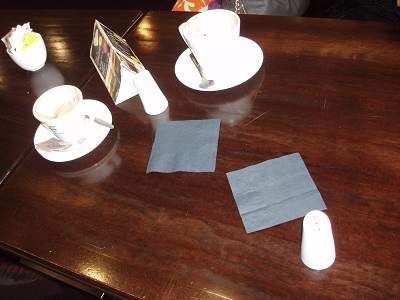
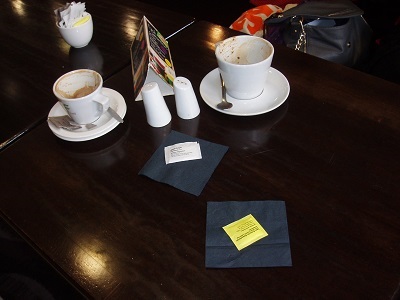
I have never had so much fun in a coffee shop!
Continuing my A - Z of a writer's life.
I had been trying to get something published for over ten years. So when an editor from Mills & Boon wrote to me, saying that she liked the first 3 chapters of my story, and could I send in the rest, I got very, very excited. I spent every spare minute up in my room, on an old sun lounger, my laptop on my lap, notes spread all over the bed, until the manuscript was ready to send in.

Unfortunately, by that time, I'd given myself a permanent crick in the neck. (Chair was next to the bed, notes on the top, so typing with my head permanently turned to the right) Instead of easing, once I'd posted my precious parcel off, the pain kept on getting worse, until the morning I woke up almost unable to move.
I'd already had some treatment from a chiropractor for a frozen shoulder. But having my shoulder gently manipulated turned out to be totally different from the way he approached a solidly stuck neck. You know in those comedy shows, where a white-coated man grabs someone's head, and wrenches it round to the sound effect of something ripping? Very funny to watch, but not so funny when actually experiencing it. But at least I was no longer in agony.

Until the publishers requested revisions. And I spent another few frantic weeks, up in my room, going over and over my manuscript until I'd got it perfect.
The chiropractor gave me a stern talking to, (as well as half wrenching my head off to free my neck up). I was not to type looking to one side all the time, but get myself a desk. I was to throw away my sun lounger and get a proper typing chair. And I was not to type for more than 15 minutes at a time.
I nodded, (well, at least I could!) smiled, and agreed with everything he said, whilst privately thinking how unworkable all his suggestions were. I lived in a tiny house, with nowhere to put a desk. Let alone throw away my comfy sunlounger, which I could fold up and stack away when I wasn't typing. And as for stopping work every 15 minutes to go and do stretches - how impractical was that? It sometimes takes 20 minutes to really get into "the zone", as any artistic person could have told him. (Indignant toss of the head - since I could now move my head without flinching)

Still, since I didn't want to spend every penny I earned from my writing on physiotherapy, I thought I had better adopt some of his suggestions, or face a future fraught with back trouble.
Hubby bought me a chair for my birthday, and to celebrate landing my first contract. And I did buy a kitchen timer. Instead of setting it to 15 minutes, I set it to one hour. This has worked very well for me, for the last five years. Every hour, the timer goes off, reminding me to get up and stretch, so I can just concentrate on my story, rather than clock-watching.
I won't say I am completely free from back problems. It seems to be a hazard of the job, from what I can gather speaking to other writers. But at least the chair, the kitchen timer, and the regular stretching keeps it at a reasonable level.
I've decided to write a series of short articles about the things I've learned since becoming a published writer. This month I'm starting (strangely enough) with A is for...
Well, Author, obviously! Nothing beats the feeling of getting that call from a publisher, saying that they want your work. (Or not much, anyway).
Only, the minute you become an Author, you have to start making a lot of decisions. Like, for instance, should you take a pen name? And if you do, how do you choose it?
I knew right from the start I didn't want to write under my own name. I value my privacy, you see. When I write that best seller, I don't want to be staked out by paparazzi who've discovered where I live...(delusions of grandeur? Moi?) And so I informed the lovely, intelligent woman who'd recognized the brilliance of my first book that yes, I did want to write under a pseudonym. And how did I want to be known?
Christy Kendrick, I replied. (Christy was my sister's pet name for me, and Kendrick my grandmother's maiden name, and I thought it had a kind of ring to it. As though it should belong to a writer of historical romance. I'd even opened a new email account for my fan mail as christyk...) There was a brief silence on the other end of the phone. Then, "Well, we already have a Kendrick writing for Mills & Boon, and we don't want readers to get confused. But as soon as you've come up with something else, we will send out a contract." Mild panic ensued. If I didn't come up with a pen name they liked, would they change their minds about offering me a contract?

Hurriedly, I wrote a list of about half a dozen names I thought might work. (Including Sue Kray, which is the Anglicized version of sucrée, or, "The sweet lady" which was what I was used to being called in my job as merchandiser for jelly babies).
It was the editorial team at Mills & Boon who selected the name of Annie Burrows out of the list I sent them. Which I suggested because Anne is my middle name, and Burrows is my married name. So writer me still feels like a part of "real life" me.(Although when I went to my first conference as a published writer, and people asked me what my name was, I had to look at my name badge to check!)I'm more used to being Annie now. Annie the Author. It has a nice, alliterative ring. Although later on, I discovered the way I should have picked my author name. People who know what they are doing advise you to consider where you might get put on the shelves, when picking your author name, to maximise your earning potential. Early in the alphabet is good, for readers who browse in alphabetical order. Or late, for those who browse in reverse alphabetical order. Or next to someone really famous in your field, so that people pick up your book while they're looking for someone else. So I should have been something beginning with H (for Georgette Heyer fans).
Hey, ho. Life is one long learning curve. And next month I will be sharing what else I've learned since I've become a published author. Something beginning with B...